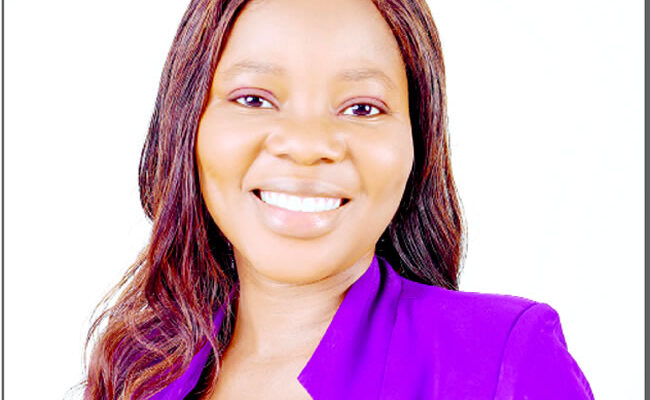Mrs Olufunke Oluwatobiloba-Ojelabi (popularly known as Olufunke Folorunsho) is passionate about adding value to lives. In this interview with IFEDAYO OGUNYEMI, the Executive Director of Hopespring To Africa, speaks about the eradication of poverty and provision of quality education for the underprivileged in Africa among other issues. Excerpts:

There is a poverty phenomenon inherent in Nigeria. How would you say this is affecting the young people in the country?
Nigeria has the largest population in Africa. With over 200 million people, it is one of the most populated countries in the world and with over 133 million people living in multidimensional poverty. There is no doubt that lack of education has been one major cause of poverty in Nigeria as it perpetuates itself generation after generation and leads to lower standards across all sectors including politics, economics, and business life. It also results in a high level of illiteracy, which is attributed to the fact that many children do not have access to quality education. This is one of the reasons why there are so many young people in Nigeria who cannot read or write. The politicians have found some of them to be available for thuggery, vandalisation, political uproar and other anti-social activities due to poverty. The effect of poverty on young people in Nigeria currently cannot be overestimated and this has resulted into a lot of issues the country is facing today.
A lot has been done by governments, corporate entities, and individuals to stem the tide of poverty in the country but there seems to be no tangible results or improvement. Why do you think that is?
In the year 2000, former President of Nigeria Olusegun Obasanjo introduced the Poverty Alleviation Programme (PAP) but later halted it and replaced it with the National Poverty Eradication Programme (NAPEP) in 2001. We also have a lot of programmes by government, corporate entities, and individuals, and even us at Hopespring to Africa; we are trying to contribute our own quota towards poverty eradication. However, all these programmes seem not to be having a feasible high ratio effect because of the complexity of our country and, we have not really dealt with the root of the problem itself. The high level of illiteracy among adults cannot be blamed entirely on the lack of resources; it also results from cultural practices that discourage educational opportunities for women and girls, even if they want them badly enough. For example, when girls marry young (usually before age 18), their husbands may force them into domestic work instead of allowing them to continue their education—even though this means losing their dowry! When parents send young females off to marry early instead of educating themselves as well as providing support during marriage negotiations/settlement periods (which last several years), they are not just eliminating any potential future income stream but also creating a burden on society itself through increased healthcare costs due to illnesses caused by lack of education.
From my personal experience so far, there is a need for more educational opportunities for children in Nigeria. Education is a fundamental right, which should be guaranteed to every child in Nigeria. It is the most key factor that can determine their future and success in life. There are other factors like poor knowledge of investment strategies, unemployment, corruption, violence, laziness, underutilisation of resources, inequality, absence of economic diversification. But I believe our government needs to focus more on education right from the grassroots level.
In your view, what would you describe as the holistic way to address the increasing rate of out-of-school children in Nigeria?
Sincerely, out-of-school children rate in Nigeria is alarming because my NGO works with the grassroot level. I can categorically say that I know this area so well and you may be surprised to know that one of the main causes why children are out of school in Nigeria is poverty.
Poverty makes it difficult for parents to send their children to school or even get them food if they do attend classes at all. According to statistics, India, Nigeria, and Pakistan have the highest out-of-school children rates in the world. If children are not receiving an education, then their future is bleak. My NGO gives scholarships to the underprivileged, and during a one-on-one talk with our beneficiaries, the issue is always money. It is my belief that if the government makes primary, secondary education free it will go a long way. Especially paying for their WAEC and JAMB fees if possible. A lot of students are stuck at SS3 because they can’t afford the WAEC/JAMB fees.
What would you describe as the remarkable achievements Hopespring To Africa has recorded so far while caring for underprivileged children?
This year, Hopespring To Africa clocked a decade, and we are indeed grateful to God for the process so far. Through our five strategies of reaching out to the underprivileged, the one I would love to mention is paying WAEC fees for the underprivileged students. This set of children have already lost hope regarding sitting for exams and seeing the joy and excitement on their faces always makes us happy and fulfilled.
What inspired you to start this initiative?
I had the chance to live with my grandmother in my early years. As I grew up, I realised that most times people want to do something and have dreams but are always incapacitated. At that time, I saw a lot of young people dropping out of school and getting married with the hope that things would get better for their parents when they do get married but things do not always end up as they planned instead the suffering continues. Personally, I believe that the best gift you can give anyone is sponsoring that person to school. For me, you are saying, let me teach you how to catch fish. I started the NGO in 2013 during my National Diploma days at Moshood Abiola Polytechnic because I have passion to help people so that they can become the best version of themselves, and I see education as a tool of eradicating poverty in Nigeria and Africa at large.
What are the challenges that you have faced in the course of your journey and how did you overcome them?
Our major challenge so far has been accessing grants and funding. I can practically mention the names of people who have sponsored and donated for the past 10 years because they are few. As an NGO, the funds one is able to access will determine the number of beneficiaries. How have we been able to solve this? One of the things I will say is that we are not fundraisers, we are givers and that is why not just those who donate to us are involved but also, the team members are part of the sustainability development of the mission and vision state of the organisation. Hopespring to Africa is not just an NGO it is a call and platform to impact people and make our world a better place of living. So far, it has been more of self-generated funds but God has never failed us despite all odds.
READ ALSO FROM NIGERIAN TRIBUNE







